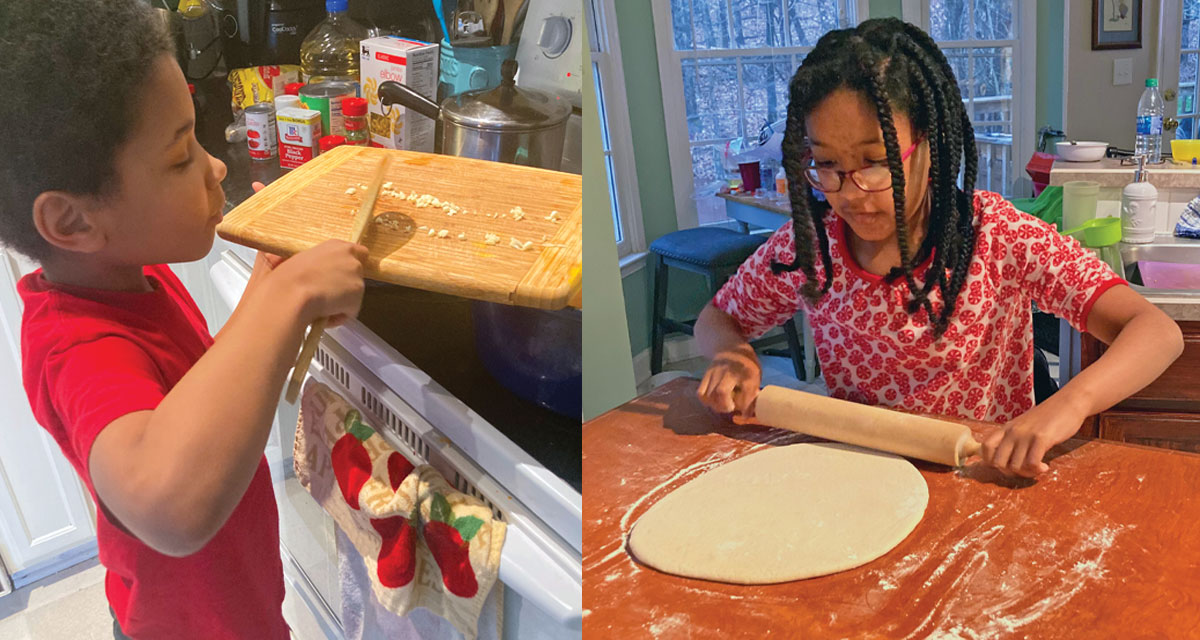BY SYDNEY D. RICHARDSON, PH. D., A TRIAD MOMS ON MAIN BLOGGER
It all started when my daughter asked to help make breakfast a few years ago. My husband cracked the eggs, and my daughter began moving the whisk in a circle. My son then walked into the kitchen and asked if he could make the pancakes. I made the batter and he started stirring. In fact, he stirred so hard that pancake batter flew onto the kitchen wall. I had to teach him how to stir slowly and teach my daughter the difference between stirring and whisking. They were ages six and four at the time. Later, the children learned how to crack eggs and measure ingredients. I still must watch for eggshells in the bowls, but they are progressing nicely. Now, they are helping with dinner, placing baking sheets into the oven, and understanding what spices go with what food dishes. To be honest, I’m not teaching the cooking techniques in order, but the point is that the kids are learning and enjoying cooking.
Learning to cook is different for children today than it was decades ago. There are kids’ cooking shows, kids’ cookbooks, and even cooking kits for children. Regardless of the method that is used, cooking is a valuable skill for children to learn. They become educated on how food is prepared and where it comes from. The act of cooking builds their confidence, especially when they are learning to handle heavy pots and pans, and the difference between simmering and boiling water. Cooking also makes them feel “older.” My eight-year-old is a great example of this. Cooking gives her more responsibility and freedom. It allows her to experiment (safely) and try new techniques. But the best part of children learning to cook is that they try new foods and ingredients because they are the ones putting them into dishes. My children no longer object to new vegetables. They also know that there are a variety of spices like turmeric, rosemary, cayenne pepper, ginger, and allspice. Now, to be honest, they didn’t become adventurous spirits overnight. It took time and patience, and there are still some foods that they won’t try. However, we’re farther along than we were a few years ago.
If you’ve never tried to cook with your kids or you want to try it differently, consider the following tips:
Let them lead: I never made my kids cook with me. Once they said, “I want to help,” I gave them a choice of what to help with. Children choosing what they want to do puts them at ease and makes it easier for you to guide them.
Give it time: If it is the first time they want to help in the kitchen, don’t let them when you’re in a hurry. Everyone will be frustrated, and nothing will work well. Instead, let them help you cook when you have time to watch over and instruct them.
Don’t be discouraged if they stay for a short time: The first time my son helped me in the kitchen, he stayed for about six minutes. Then he was ready to play. The point is that children try to cook. That can be anything from stirring sauces to washing vegetables. Over time, a child will stay longer and help more.
Have fun: Let the flour get on your clothes. Everything does not have to be perfect. The children are learning and at the end, you have a meal. Have fun while you’re doing everything and take lots of pictures.
Out of the many skills that children learn, cooking is one of the best. As your children get older, allow them to try new recipes and experiment with their own meals. Who knows, you may have the next-best chef in your house!



















